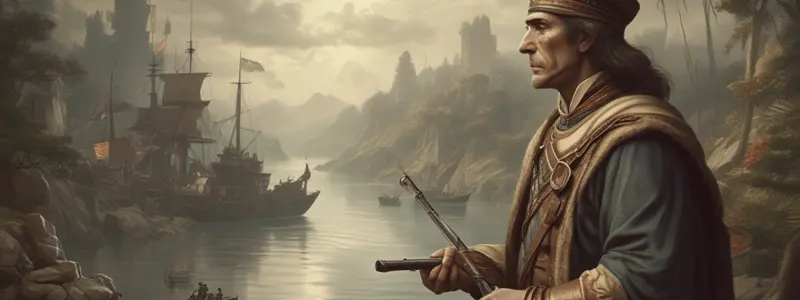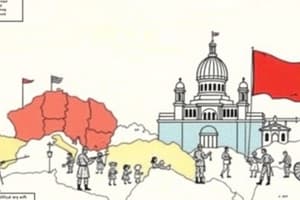Podcast
Questions and Answers
What does political history primarily focus on?
What does political history primarily focus on?
- Cultural practices and beliefs
- Economic systems and trade
- Societal norms and lifestyles
- Political events and governmental structures (correct)
What is one key aspect of source criticism within historical methodology?
What is one key aspect of source criticism within historical methodology?
- Exploring societal norms and lifestyles
- Creating timelines of events
- Assessing the reliability and context of sources (correct)
- Studying the development of civilizations
Which period in history is characterized by the rise of feudalism?
Which period in history is characterized by the rise of feudalism?
- Prehistory
- Medieval History (correct)
- Modern History
- Ancient History
Who was Julius Caesar?
Who was Julius Caesar?
What theme does the Renaissance primarily emphasize?
What theme does the Renaissance primarily emphasize?
Which historical figure is known for his role in spreading Greek culture?
Which historical figure is known for his role in spreading Greek culture?
What does economic history analyze?
What does economic history analyze?
What period is defined as the time before written records?
What period is defined as the time before written records?
Flashcards
History Definition
History Definition
The study of past events, especially human actions, using various sources like documents and artifacts.
Political History
Political History
Focuses on political events, leaders, and governments throughout time.
Social History
Social History
Study of societal norms, daily life, and culture.
Economic History
Economic History
Signup and view all the flashcards
Cultural History
Cultural History
Signup and view all the flashcards
Source Criticism
Source Criticism
Signup and view all the flashcards
Chronology
Chronology
Signup and view all the flashcards
Interpretation
Interpretation
Signup and view all the flashcards
Prehistory
Prehistory
Signup and view all the flashcards
Ancient History
Ancient History
Signup and view all the flashcards
Medieval History
Medieval History
Signup and view all the flashcards
Modern History
Modern History
Signup and view all the flashcards
Alexander the Great
Alexander the Great
Signup and view all the flashcards
Julius Caesar
Julius Caesar
Signup and view all the flashcards
Napoleon Bonaparte
Napoleon Bonaparte
Signup and view all the flashcards
Mahatma Gandhi
Mahatma Gandhi
Signup and view all the flashcards
Renaissance
Renaissance
Signup and view all the flashcards
Enlightenment
Enlightenment
Signup and view all the flashcards
Industrial Revolution
Industrial Revolution
Signup and view all the flashcards
Civil Rights Movement
Civil Rights Movement
Signup and view all the flashcards
Historiography
Historiography
Signup and view all the flashcards
Historical Periods
Historical Periods
Signup and view all the flashcards
Historical Figures
Historical Figures
Signup and view all the flashcards
Importance of History
Importance of History
Signup and view all the flashcards
Historical Methodology
Historical Methodology
Signup and view all the flashcards
Study Notes
Key Concepts in History
-
Definition of History:
- The study of past events, particularly in human affairs.
- Involves analysis of documents, artifacts, and other sources.
-
Branches of History:
- Political History: Focus on political events, leaders, and governmental structures.
- Social History: Examines societal norms, lifestyles, and everyday life.
- Economic History: Analyzes economic systems, trade, and financial practices over time.
- Cultural History: Studies cultural practices, art, and belief systems.
-
Historical Methodology:
- Source Criticism: Evaluating the reliability and context of sources.
- Chronology: Establishing timelines of events.
- Interpretation: Understanding the significance and motivation behind historical actions.
-
Major Historical Periods:
- Prehistory: Time before written records; includes the Stone Age, Bronze Age, and Iron Age.
- Ancient History: Development of civilizations, such as Mesopotamia, Egypt, Greece, and Rome.
- Medieval History: Middle Ages characterized by feudalism, the rise of kingdoms, and the influence of the Church.
- Modern History: From the Renaissance to the present; includes industrialization, colonization, world wars, and globalization.
-
Important Historical Figures:
- Alexander the Great: Conqueror who spread Greek culture across a vast empire.
- Julius Caesar: Roman general and statesman whose actions led to the rise of the Roman Empire.
- Napoleon Bonaparte: French military leader who became Emperor and significantly influenced European affairs.
- Mahatma Gandhi: Leader in the Indian independence movement against British rule through nonviolent civil disobedience.
-
Influential Movements:
- The Renaissance: Revival of art and learning in Europe; focus on humanism.
- The Enlightenment: Intellectual movement emphasizing reason, individualism, and skepticism of authority.
- The Industrial Revolution: Shift from agrarian economies to industrialized societies; led to urbanization and changes in labor.
- Civil Rights Movement: Struggle for social justice and equality, particularly in the U.S. during the 1950s and 1960s.
-
Historiography:
- The study of how history is written and interpreted; includes different perspectives and biases.
- Recognizes that history can change over time based on new evidence or interpretations.
-
Importance of History:
- Helps understand contemporary society and cultural identity.
- Provides lessons from past successes and failures.
- Encourages critical thinking and informed citizenship.
Definition of History
- Study of past events, particularly human affairs, utilizing documents, artifacts, and various sources for analysis.
Branches of History
- Political History: Concentrates on political events, influential leaders, and government structures throughout time.
- Social History: Investigates societal norms, lifestyles, and everyday life experiences of different cultures.
- Economic History: Examines the evolution of economic systems, trade practices, and financial behaviors across periods.
- Cultural History: Focuses on cultural practices, artistic expressions, and belief systems that shape societies.
Historical Methodology
- Source Criticism: Evaluates the reliability and context of historical sources to verify their authenticity.
- Chronology: Establishes timelines to organize past events chronologically, highlighting cause and effect relationships.
- Interpretation: Analyzes the significance and motivations behind historical actions to understand their impact.
Major Historical Periods
- Prehistory: Encompasses the era before written records, including the Stone, Bronze, and Iron Ages.
- Ancient History: Covers the rise of civilizations such as Mesopotamia, Ancient Egypt, Greece, and Rome.
- Medieval History: Characterized by feudalism, the rise of kingdoms, and the prominent influence of the Church during the Middle Ages.
- Modern History: Extends from the Renaissance to contemporary times, marked by industrialization, colonization, world wars, and globalization.
Important Historical Figures
- Alexander the Great: Known for his vast empire and the spread of Greek culture across conquered regions.
- Julius Caesar: A pivotal Roman general whose actions were instrumental in the transition to the Roman Empire.
- Napoleon Bonaparte: Significant military leader and Emperor of France who shaped European political landscapes.
- Mahatma Gandhi: Key figure in the Indian independence movement, advocating nonviolent civil disobedience against British colonial rule.
Influential Movements
- The Renaissance: A pivotal cultural revival in Europe that emphasized art, learning, and humanistic principles.
- The Enlightenment: Intellectual movement that championed reason, individualism, and skepticism towards traditional authority.
- The Industrial Revolution: Marked a transition from agrarian economies to industrial societies, resulting in urban growth and changes in labor dynamics.
- Civil Rights Movement: A significant social movement in the U.S. during the 1950s and 1960s aimed at achieving justice and equality.
Historiography
- Study of how history is recorded and interpreted; recognizes differing perspectives and biases that influence historical narratives.
- Acknowledges that historical interpretations may evolve with new evidence or understandings over time.
Importance of History
- Essential for comprehending contemporary society and cultural identity.
- Offers lessons from historical successes and failures, enriching critical thinking skills.
- Fosters informed citizenship and engagement with current societal issues.
Studying That Suits You
Use AI to generate personalized quizzes and flashcards to suit your learning preferences.



